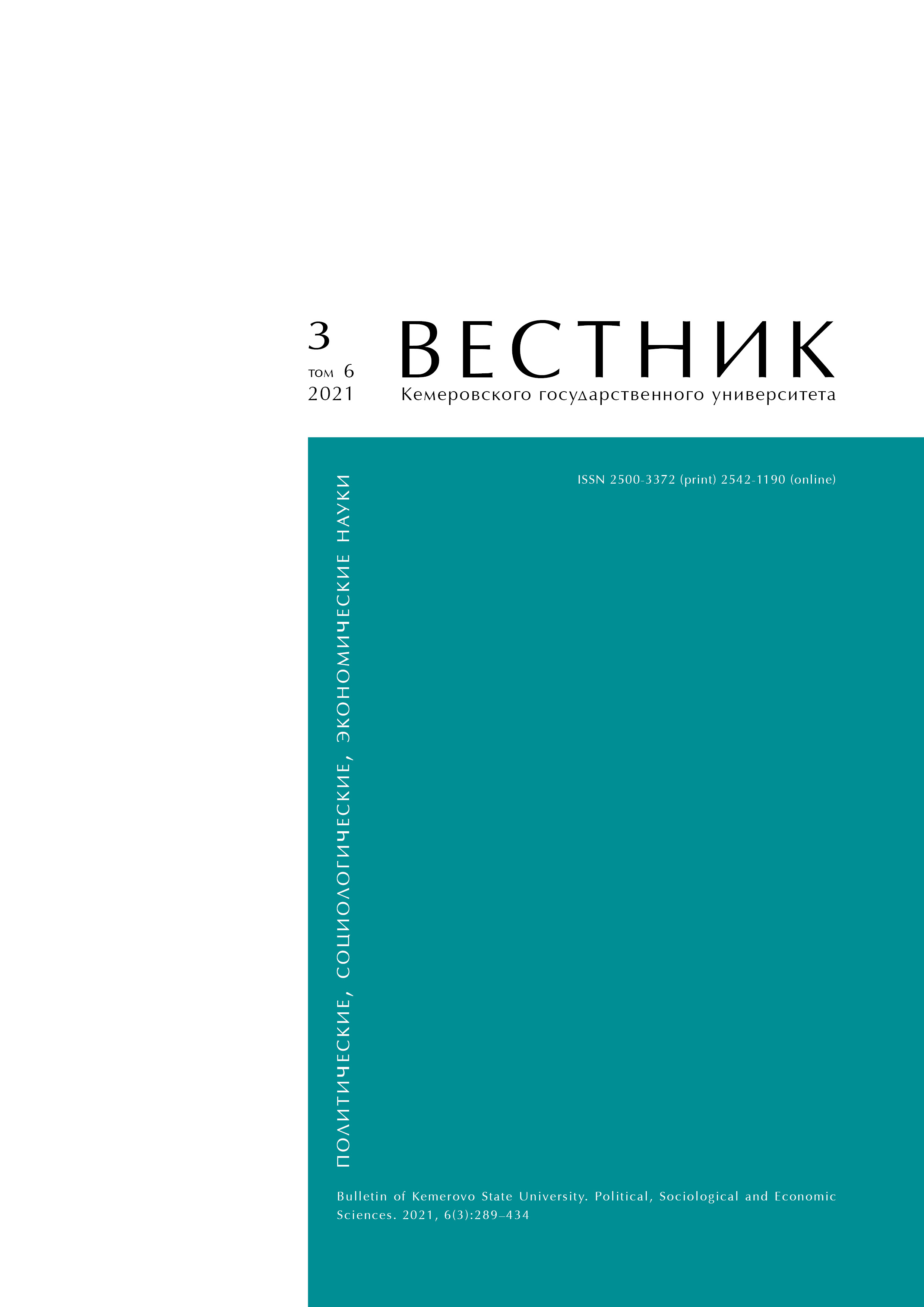Russian Federation
UDC 33
The present article introduces a new system of indicators for assessing the sustainable competitiveness of innovative industrial clusters. The authors reviewed foreign and domestic approaches to monitoring and evaluating industrial clusters and classified them according to assessment type, research level, costs, and effects. Sustainable competitiveness proved to be the most complex characteristic of any cluster. It could be divided into two groups of parameters, i.e. 1) long-term competitiveness and 2) stability as a socio-ecological and economic system. Each group was given a list of indicators for quantitative and qualitative assessment, which included indicators of potential development, organization and management, socio-ecological and economic stability, etc. The research revealed some gaps in the Russian statistics of cluster development, which hinder the information support for monitoring and evaluating the sustainable competitiveness of clusters. As a result, the current databases on the social, economic, and environmental aspects of Russian clusters are fragmented and chronologically incompatible.
cluster system, socio-ecological and economic sustainability, benchmarking, development potential, organizational and managerial excellence, efficiency
1. Porter M. E. Clusters and economic policy: aligning public policy with the new economics of competition. ISC White paper. Boston: Harvard Business School, 2007, 10.
2. Enright M. J. Why clusters are the way to win the game? Word Link, 1992, (5): 24-25.
3. Enright M. J., Ffowcs-Williams I. Local Partnership, Clusters and SME Globalisation. OECD Workshop paper, 2001, 38.
4. Humphrey J., Schmitz H. Governance and upgrading: linking industrial cluster and global value chain research. IDS Working Paper 120. Brighton: IDS, 2000, 37.
5. Sölvell Ö., Lindqvist G., Ketels C. The cluster initiative greenbook. Stockholm: Brommatryck AB, 2003, 93.
6. Asheim B. Localiced learning, innovation and regional clusters. Cluster policies - cluster development?, ed. Mariussen Å. Stockholm, 2001, 58.
7. Andersson T., Serger S. S., Sörvik J., Hansson E. W. The Cluster Policies Whitebook. Malmö: IKED, 2004, 266.
8. Brachert M., Titze M., Kubis A. Identifying industrial clusters from a multidimensional perspective: methodical aspects with an application to Germany. Papers in Regional Science, 2011, 90(2): 419-439. https://doi.org/10.1111/j.1435-5957.2011.00356.x
9. Gorkin A. P., Smirnyagin L. V. On the factors and conditions for the placement of capitalist industry. Izv. Akad. Nauk, Ser. Geogr., 1973, (1): 68-72. (In Russ.)
10. Cluster policy: concentration of potential for achieving global competitiveness, eds. Bortnik I. M., Gokhberg L. M., Klepach A. N., Rudnik P. B. , Fomichev O. V. , Shadrin A. E. St. Petersburg: Corvus, 2015, 356. (In Russ.)
11. Innovative clusters of the digital economy: theory and practice, ed. Babkin A.V. St. Petersburg: Izd-vo Politekch un-ta, 2018, 676. (In Russ.) https://doi.org/10.18720/IEP/2018.4
12. Vertakova Yu. V., Polozhentseva Yu. S., Hlynin M. Yu. Formation and development of industrial clusters. Tekhniko-tekhnologicheskie problemy servisa, 2014, (1): 92-99.
13. Kutsenko E. S. Pilot innovative territorial clusters in Russia: a sustainable development model. Foresight-Russia, 2015, 9(1): 32-55. (In Russ.) https://doi.org/10.17323/1995-459X.2015.1.32.55
14. Brikin A. V., Kolegov K. A. Factor model of estimation of competitiveness of innovative clusters of electronics on the basis of the analysis of stages of their life cycle. RISK: Resursy, Informatsiia, Snabzhenie, Konkurentsiia, 2012, (1): 134-139. (In Russ.)
15. Ivanov P. D., Reshetko N. I. Mechanisms of industrial clusters competitiveness assessment. Nauka i biznes: puti razvitiya, 2019, (5): 91-94. (In Russ.)
16. Klepikova N. I. The assessment of effectiveness of the formation of an industry-based cluster. Fundamentalnye issledovaniia, 2013, (4-4): 934-939. (In Russ.)
17. Kostygova L. A. The compliance of a titanium cluster with sustainable development of the branch. Russian Journal of Industrial Economics, 2013, (4): 32-36. (In Russ.)
18. Pantyushina O. V. The methodical basis of estimation of flax cluster elements' competitiveness. Economic and Social Changes: Facts, Trends, Forecast, 2011, (3): 104-114. (In Russ.)
19. Fiyaksel E. A., Nazarov M. G., Islankina E. A. European experience of cluster internationalization for improving national competitiveness. Innovacii, 2013, (2): 86-95. (In Russ.)
20. Shekhtman A. Yu. System analysis of approaches to estimation of effectiveness of cluster development policy. System analysis in design and management: Proc. XXII Intern. Sci.-Prac. Conf., St. Petersburg, 22-24 May 2018. St. Petersburg: Izd-vo Politekhn. un-ta, 2018, pt. 2, 18-25. (In Russ.)
21. Shchetinina N. Yu. Competitiveness of technological clusters. Creative economy, 2012, 6(12): 72-80. (In Russ.)
22. Meshkov I. A. Main features of the EU cluster policy. Sovremennaya Evropa, 2020, (1): 182-190. (In Russ.) http://dx.doi.org/10.15211/soveurope12020182190
23. Chkoniia A.-M. E., Meshkov I. A. The state of cluster development in the EDB member states. Evraziiskii bank razvitiia, 2019, 48. (In Russ.)
24. Wintjes R., Spinoglio M., Pellegrin J., Hausemer P., Amichetti C. Smart Guide to cluster policy monitoring and evaluation. Luxembourg: Publication Office of the European Union, 2020, 62. https://doi.org/10.2826/519400
25. Salimova T. A., Biryukova L. I. The concept of sustainable competitiveness of the enterprise. Nauka i biznes: puti razvitiya, 2020, (5): 148-151. (In Russ.)
26. Syupova M. S., Bondarenko N. A. Indicators of socio-economic development of the municipality for monitoring and management of the territory. Vestnik Tikhookeanskogo gosudarstvennogo universiteta, 2017, (1): 155-164. (In Russ.)
27. Krakovskaya I. N. Industrial clusters: factors of sustainable competitiveness. Priority vectors of industrial and agricultural development: Proc. IV Intern. Sci.-Prac. Conf., Makeyevka, 15 Apr 2021. Makeyevka: DONAGRA, 2021, vol. 3, 220-224. (In Russ.)
28. Change management in modern companies, eds. Nizhegorodtsev R. M., Reznik S. D. Moscow: INFRA-M, 2018, 263. (In Russ.)
29. Hollander H. Methodology report for the European panorama of clusters and industrial change and European cluster database. Luxembourg: Publication Office of the European Union, 2020, 45. https://doi.org/10.2826/466162


















